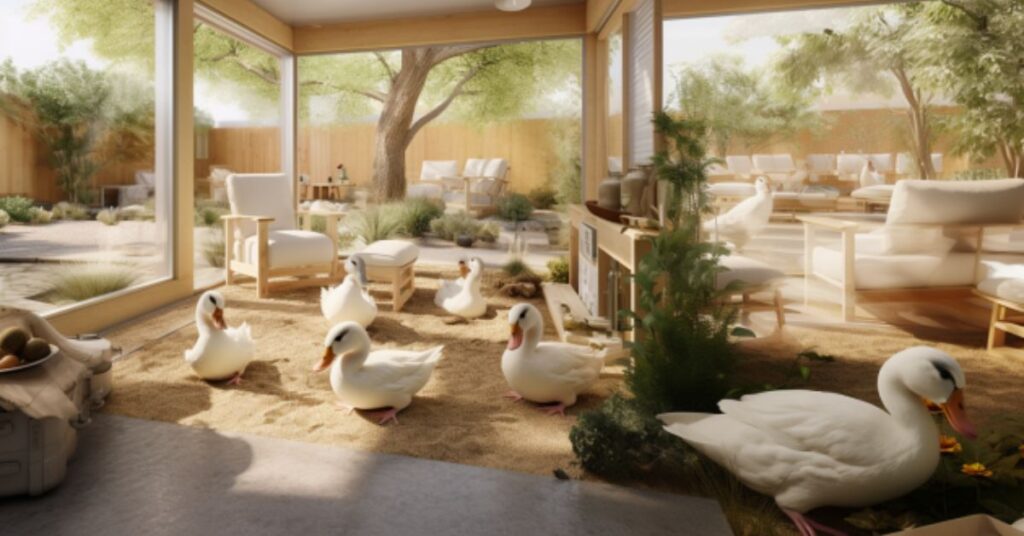As a homesteader exploring different types of livestock to raise on my farm, I’ve been considering adding both ducks and goats. But I wasn’t sure if these two species with very different needs could peacefully coexist. So I did some research to find out if ducks and goats can live together successfully.
The Benefits of Raising Ducks and Goats Together
Ducks Provide Natural Pest Control
One of the biggest perks of raising ducks and goats together is that ducks act as a natural defense against pests that can bother goats.
Ducks are voracious eaters and will happily gobble up pesky insects like mosquitos, fleas, ticks, and flies that can transmit diseases to goats.
Their webbed feet also help them hunt for slugs and snails. With ducks patrolling your pastures, your goats will have significantly lower exposure to parasites and other creepy crawlies.
Goats Protect Ducks from Predators
On the flip side, goats can help protect ducks against predators like foxes, coyotes, raccoons, and hawks. Most predators will think twice about approaching a flock of ducks if they have to get past a herd of large, intimidating goats with sharp horns first.
Goats are naturally very protective of their herd, so they will likely defend ducks that they see as part of their group. The noisy bleating of goats also helps scare away predators.
More Efficient Use of Pasture Space
Raising ducks and goats together allows you to maximize the use of your pasture space. Goats prefer to eat different vegetation than ducks, so they won’t compete for food resources.
Goats nibble on tougher shrubs, trees, and weeds while ducks graze mainly on grasses, aquatic plants and insects. Housing them together makes efficient use of your grazing areas.
Shared Body Heat in Winter
During cold winter months, goats and ducks can huddle together to share body heat. Goats have a higher normal body temperature than ducks, so they can help keep ducks warm.
Similarly, ducks have more padding from their downy feathers that provides insulation against the cold for the goats.
Putting their enclosures close together or even allowing them to co-mingle helps both species stay warmer.
More Animal Companionship
Goats are highly social herd animals that do better when they have companions of any kind around. The presence of ducks helps provide goats with more animal friends to interact with.
And ducks placed with goats are less likely to exhibit signs of stress than lone ducks. The diversity of species is enriching for both animals.
Potential Challenges of Housing Ducks and Goats Together

Preventing Contamination of Goat Water
One difficulty with raising ducks and goats together is keeping goat water sources clean. Ducks love splashing around in the water and will inevitably get their feet dirty. They’ll track that mud and muck into goat water containers.
Goats are very picky about only drinking clean water. They may refuse to drink if their water source gets too dirty.
At best, dirty water can cause gastrointestinal illness in goats. At worst, it can lead to potentially fatal diarrhea if contaminated by duck feces.
There are a few solutions to avoid this problem:
- Install duck-proof water containers elevated or positioned so ducks can’t access them.
- Use smaller containers just big enough for goat heads to prevent ducks from bathing.
- Refill goat water multiple times per day so it stays clean.
- Provide a separate grassy pond area just for ducks away from goat water.
Stopping Goats From Eating Duck Feed
While ducks can safely eat some goat feed, it’s very unhealthy for goats to eat significant amounts of duck feed.
Ducks require more protein and their feed contains fish meal, insects, and other animal products that can actually be toxic to goats.
Goats are grazers meant to consume a plant-based diet. Eating duck feed can cause malnutrition, digestive issues, and bloating in goats.
To prevent accidental poisoning, here are some tips:
- Feed ducks in an enclosed shelter or fenced off area goats can’t access
- Use covered, goat-proof feeders for ducks
- Provide just enough feed so ducks eat it all right away
- Supervise feeding time so you can shoo goats away
Potential Injury to Ducklings
Adult ducks hold their own just fine with goats. But unsupervised baby ducklings are at risk of being injured if goats step on them or get too rough. Protect ducklings by:
- Giving duck mothers a safe nesting area away from goats
- Waiting until ducklings are 5-6 weeks old before co-mingling with goats
- Providing boards or shelters for ducklings to hide under if chased
- Spreading out food and water sources to minimize competition
Increased Parasite Risk
While goats and ducks don’t typically share parasites back and forth, the higher density of animals from housing them together can increase parasite loads in the environment if not managed properly. Be vigilant about:
- Providing adequate pasture space per animal
- Rotating grazing areas and letting some recover
- Removing manure frequently
- Deworming goats and ducks regularly
- Keeping bedding clean and dry
Housing Considerations for Ducks and Goats
Shelter Space
Provide adequate indoor shelter space for all your ducks and goats to be protected from weather and predators.
- 10-15 square feet per standard duck
- 20-30 square feet per pygmy or dwarf goat
- 30-40 square feet per medium sized goat
- 100+ square feet per large goat breed
Shelters should have good ventilation but be draft-free. Bed with fresh straw. Have areas for animals to perch or enrich their environment.
Fencing
Proper fencing prevents escapes and protects animals.
For ducks, use short fencing (3-4 feet high) they can’t fly or climb over. Bury bottom 1 foot underground to deter digging underneath.
For goats, use 4-5 foot high fencing minimum. Goats are expert escape artists! Use small openings max 4” x 4” so horns and heads don’t get stuck. Bury bottom 1-2 feet underground. Make sure fencing is sturdy and secure.
Pasture Size
Provide adequate pasture space for animals to graze comfortably.
- Ducks need at least 15-20 square feet per duck
- Goats need a minimum of 50 square feet per standard goat
- More space is better to prevent overgrazing and parasite issues
Divide pasture into paddocks and rotate grazing areas frequently to prevent parasite buildup and allow regrowth. Provide a pond for ducks if possible.
Best Goat Breeds To House With Ducks
Certain breeds of goats are calmer and make better companions for ducks. Ideal choices include:
- Kinder: A smaller dual-purpose goat prized for its gentle, non-aggressive temperament.
- Pygmy: Small and stocky breed that is known to be docile and mix well with poultry.
- Miniature Silky Fainting: A miniature breed with a very mellow personality, they get along great with ducks.
- Nigerian Dwarf: While still spirited, this little goat is less likely to hassle or injure ducks.
- Boer: Large meat breed but normally placid natured and not overly destructive.
Avoid ornery breeds like Alpines, Oberhasli, and Nubians who may be more prone to bullying ducks. Wethered males are calmer than intact bucks.
Best Duck Breeds To House With Goats
Some duck breeds adapt better to cohabiting with goats. Top picks include:
- Ancona: Active foragers but not overly flighty, they integrate well with other species.
- Aylesbury: Gentle, calm temperament and less noisy than some ducks.
- Cayuga: Generally peaceful ducks that don’t stray far from home.
- Rouen: Large size and mellow personality allows them to mix with livestock.
- Muscovy: Calm breed that is less likely to trigger goat chasing instincts.
Avoid high-strung breeds like Campbell, Indian Runner, or Calls that may incite goat harassment.
Daily Care Tips for Ducks and Goats Housed Together
Caring for a mixed duck and goat flock takes some extra planning but is very doable. Here are some daily management tips:
- Feed animals separately to prevent issues
- Provide fresh, clean water for goats several times per day
- Inspect animals daily for any injuries or signs of illness
- Pick up manure piles and soiled bedding promptly
- Schedule regular vet visits for deworming and health checks
- Trim goat hooves every 2-3 months to prevent injuries
- Clean and refresh duck ponds/waterers weekly
- Watch animal interactions for signs of stress or aggression
- Have separate spaces animals can be separated into if needed
Preventing Common Health Issues
With vigilance, you can avoid most health problems in your combined duck and goat herd:
Parasites: Deworm goats every 2-3 months. Use duck-safe products. Check manure and provide adequate pasture rest periods.
Bloat: Limit goat access to duck feed. Provide goat-safe anti-bloat blocks.
Respiratory Illness: Ensure good ventilation in housing. Isolate any visibly sick animals immediately.
Diarrhea: Keep water sources clean. Don’t overcrowd animals. Quarantine and treat any scouring animals.
Fowl Pox: Vaccinate ducks. Isolate any with lesions to prevent spread to other ducks.
Foot Rot: Keep bedding clean and dry. Trim overgrown hooves. Treat any limping goats.
Enterotoxemia: Vaccinate goats, especially young kids. Avoid diet changes.
Predators: Use secure housing at night. Install electric fencing if predators are an issue. Guard animals can also protect the flock.
By paying close attention to your animals’ health and being vigilant for any developing issues, you can maintain a healthy homestead.
Common Questions about Housing Ducks and Goats Together
Can goats and ducks eat the same food?
No, goats and ducks should be fed separate diets formulated specifically for their species. Goats should be fed goat-specific grain and hay. Ducks need a balanced waterfowl feed along with treats like greens, bugs, and slugs. Avoid feeding goats duck feed, which can make them sick.
Do ducks need a pond if housed with goats?
Providing a pond is ideal if space allows, but not absolutely necessary. You can use kiddie pools, water troughs, or other water containers for ducks to bathe and swim in if a pond isn’t feasible. Deep water helps ducks stay healthy.
Can ducks and goats share the same shelter?
Yes, as long as there is adequate space for all animals. Provide separate resting spaces and perching areas. Clean bedding frequently to keep the shelter sanitary. Good ventilation is important to prevent respiratory issues. Make sure ducks have access to water within the shelter.
Do ducks or goats require more care?
Goats require significantly more hands-on care and maintenance than ducks. Goats need hoof trimming, milking for dairy breeds, parasite prevention, disbudding/dehorning, and extra feeding. Ducks are lower maintenance as long as they have adequate water.
How much space do ducks and goats need?
Goats need a minimum of 50 square feet of shelter space and pasture per standard goat. Ducks require 10-15 square feet of shelter space and 15-20 square feet of pasture area per duck. Ponds, swimming areas, and grazing land is extra. More space is always better!
Final Thoughts on Housing Ducks and Goats Together
When properly managed, raising ducks and goats together can be highly rewarding. The benefits each species brings the other makes it a complementary pairing for small farms.
Just be prepared to put in extra effort to tend to their individual needs, especially when it comes to food and water. Preventing the spread of illness is also essential with any mixed livestock operation.
But the delightful antics of ducks and goats interacting more than make up for the extra work required to care for both.
If you’re willing to be attentive to their daily requirements and health, you can create a thriving homestead oasis raising goats and ducks together.
Let me know in the comments if you have any other questions!
